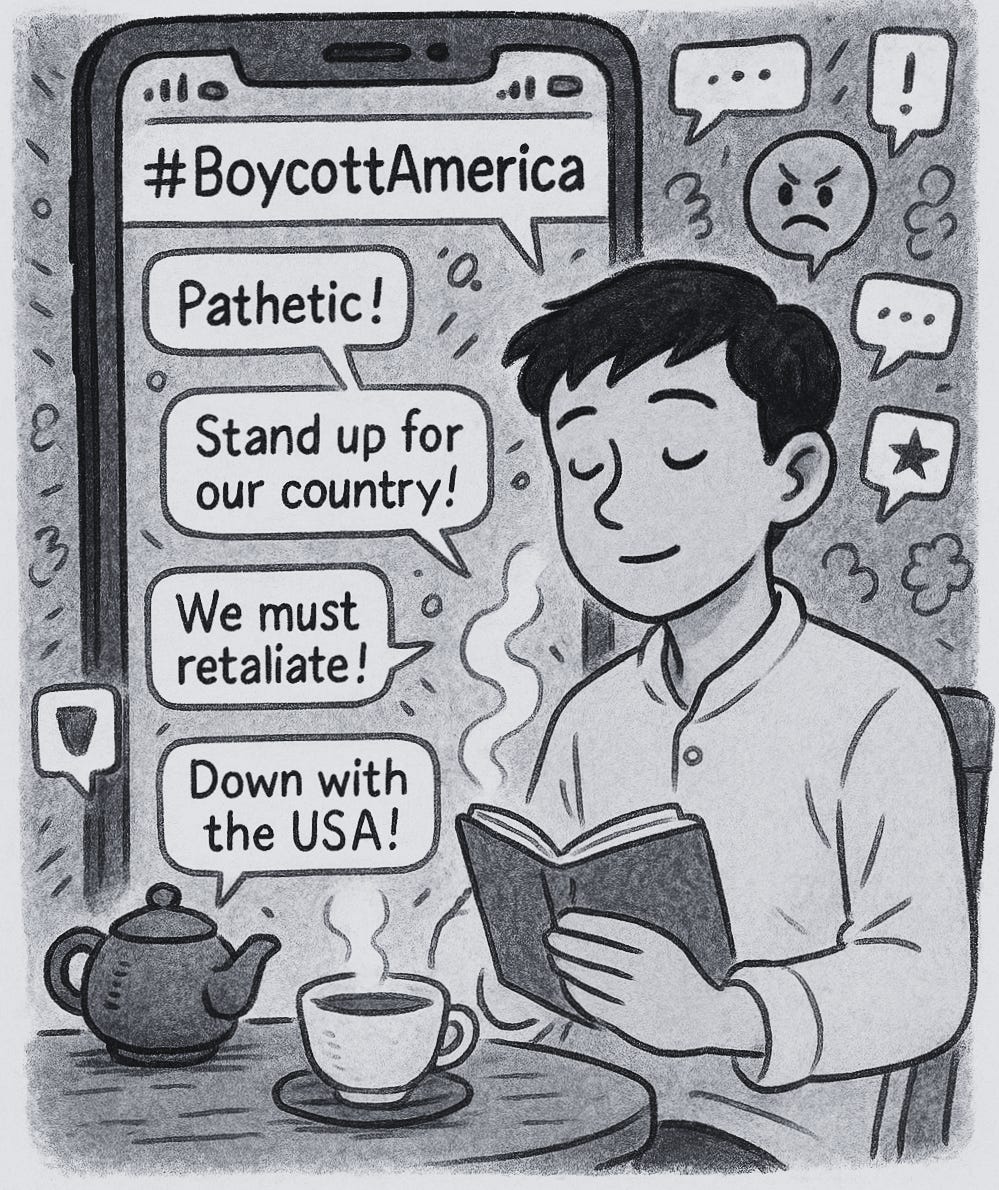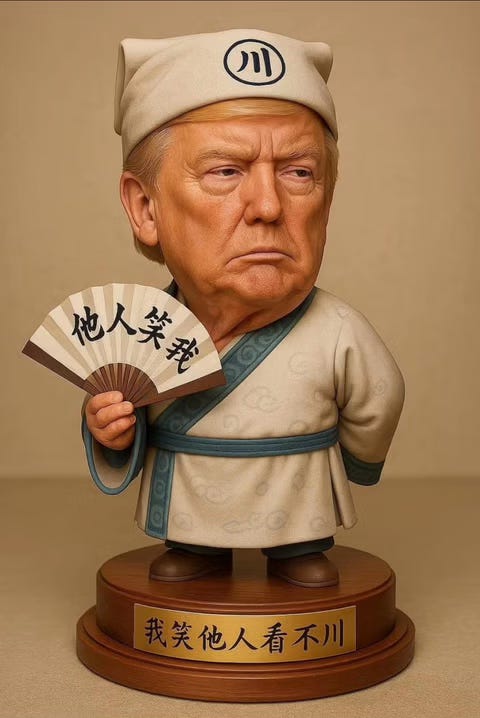The Spectacle of Nationalism
Only calm minds will make it through collective fervor.
I am always amazed by the pull of the collective force on the individual. In fact, I wonder if it is ever possible, in today’s mass media age, to think and act independently. For independent action demands critical and clear thinking, which is essentially difficult to cultivate in a suffocating cultural context.
The trade war episode has certainly caused a social whirlwind in China. In the midst of ongoing competition for geopolitical influence and technological decoupling, the US tariff policy has naturally fueled this rivalry.
From official rhetoric to social media, from netizens’ online reactions to the average business owner’s show of “patriotic” acts, it’s not hard to get a sense of nationalistic, anti-American sentiment prevailing right now.
The spin of public opinion
The Chinese government’s handling of the situation was a bit different from the rest of the world. While most countries affected by the US tariff sought channels to negotiate with the White House, Beijing started retaliation immediately.
With state media condemning US tariffs as an act of bullying, it seems, on the surface, that Beijing’s strategy was to portray itself as an innocent victim of this protectionist move from a trade partner with which it has been running the largest trade surplus for years.
This is not even mentioning the fact that, for better or worse, China’s integration into the global trading system via joining the WTO in 2001, was very much facilitated by US support.
Yet, the reality is that most of us are hardly historically minded, or choose not to be bothered by historical burdens. This is particularly the case in a situation when practical interests are involved, or when public opinion and popular sentiment demand conformity and a sort of collective action.
Public opinion thrives, most often, on the premise that there is some measure of rhetorical spin and that few ever state exactly what they feel and think. Perhaps the truth is the reverse? Could it be that people choose to voice their anger, dismay, and complaints through public platforms while remaining silent in everyday, concrete life?
At least for now, social drama is still going on and on. The emergence of memes is adding satire and humor to this show.
In the figurine of Trump in a traditional costume, he is wearing a hat with the character chuan 川 on it. The characters on the folding fan read as ta ren xiao wo (tai feng dian) 他人笑我太瘋癲, which means “many people laugh at me for being crazy”, and the characters on the base are: wo xiao ta ren kan bu chuan 我笑他人看不川 (穿), saying “I just laugh at them for not understanding the situation.” The Chinese character “chuan 穿”, pronounced the same as “川”, refers to Trump.
I wonder, underlying these sarcastic and humorous jabs, how many of us would care to take the effort to understand the consequences of blindly cheering in support of government policies. After all, managing to make ends meet and one’s family live well, in the current circumstances of trade uncertainty and economic fluctuations, is already a significant challenge for most people.
Still, I’ll have to acknowledge that all forms of staged boycotts are a hassle and that the surge of patriotic posturing is an even greater hassle in the eyes of people with a basic common sense.
If I were an official working in the communist government, I would probably keep one eye open on the unfolding of things, but most likely, there’s no need to do anything.
Let them storm and rally who want to storm and rally. But this does not mean exactly the same thing as freedom of speech. For only when the people’s laughter, anger, and scorn do not hurt that they have that freedom. When they hurt, the “good comrade” may invite them for a cup of tea.
I believe, somewhere remote from this scene of fervor, there still lie pragmatic and prudent minds, but they choose to be silent. It’s not the real resistance, but, given the restrictive social and political circumstances, choosing not to submit to the forces of conformity is already a tacit dissidence.
Politics of language and fury
This outrageous posturing of boycott declarations and antagonism is not really a novel spectacle, for there has been such mass performances before, either targeting the US or its allies.
To some extent, it’s not a stretch to say that such popular drama could happen in any place, any politicized social context.
If we survey the online mania, we can find a spectrum of digital traits. On the one hand, we can list heated denunciations, vows to boycott, price-hike declarations, and manufactured outrage. And on the other hand, we must list unity-praising editorials, curated patriotic playlists and videos, official condemnations, and calls for measured dialogue.
Among neutral qualities, I must mention cautious commentary, pragmatic analysis, reflective dissent, and data-driven appeals. These last may all be discreet stances, but caution can slip into paralysis, pragmatism may mask self-interest, and data demands may drown out moral urgency. It will be seen that all these voices, fervent, restrained, and balanced, compose a public mood that yearns for both passion and prudence. I should summarize this collective ethos as “heated realism.”
Yet, the reality may still be gloomier than what we tend to assume. Just by observing the rise and fall of online fervor, I see that something has been lost among netizens. It dawns upon me that we are all properly herded.
I keep wondering (am I too skeptical?) that the urge of every commenter to speak their minds has been muzzled and muted. Everyone has been trained, to some extent, by algorithms. What about the inner critic, what about one’s courage and intuition for honest discourse and exploration of inconvenient and unpleasant facts?
From my perspective, I would love to see contrarian views and opinions based on common sense, as a counterpoint to the war of words and online fury. Perhaps an ordinary vlogger posting their raw takes and thoughts on the trade war, maybe just showcasing an unfiltered stance on the state of things, or unboxing foreign goods in defiance, will suffice. To me, this is a digital symbol of one who refuses to echo the external and irrational demands of national sentiment.
I would consider this voice as one that does not yield to hype. In the end, it stands closer to the reality we all share, and less like the staged patriotism fed to us. That spirit of resistance against a manufactured and homogenous voice is perhaps the last best hope for reason and the bulwark of measured discourse in this social media maelstrom.
But, at the same time, I wish the sane but fewer voices do not become discouraged by the state of things. For hard and raw power is not necessarily true strength, and the resilient strength from within can last because it does not break.
Let Lao Tzu’s words become a source of consolation and inspiration when things get tough.
There is nothing weaker than water
But none is superior to it in overcoming the hard,
For which there is no substitute. (Tao Te Ching, Chapter 78, Lin Yutang's version)And, for some of these passionate netizens, I think perhaps the primary freedom they need right now is freedom from spectacle and blind nationalism.







A voice of calm reason, welcome. I expect China and US to posture in public and negotiate in private. Both sides have known for a long time that the current trading relationship could not go further without changes. 🙏
Interesting. From the POV of Southeast Asia squeezed from all sides (the latest is we are seeing an influx of cheap Chinese goods), silence is survival. Will take an incredibly resilient paradigm shift to deal with this unprecedented tug-of-war that the people never asked for.